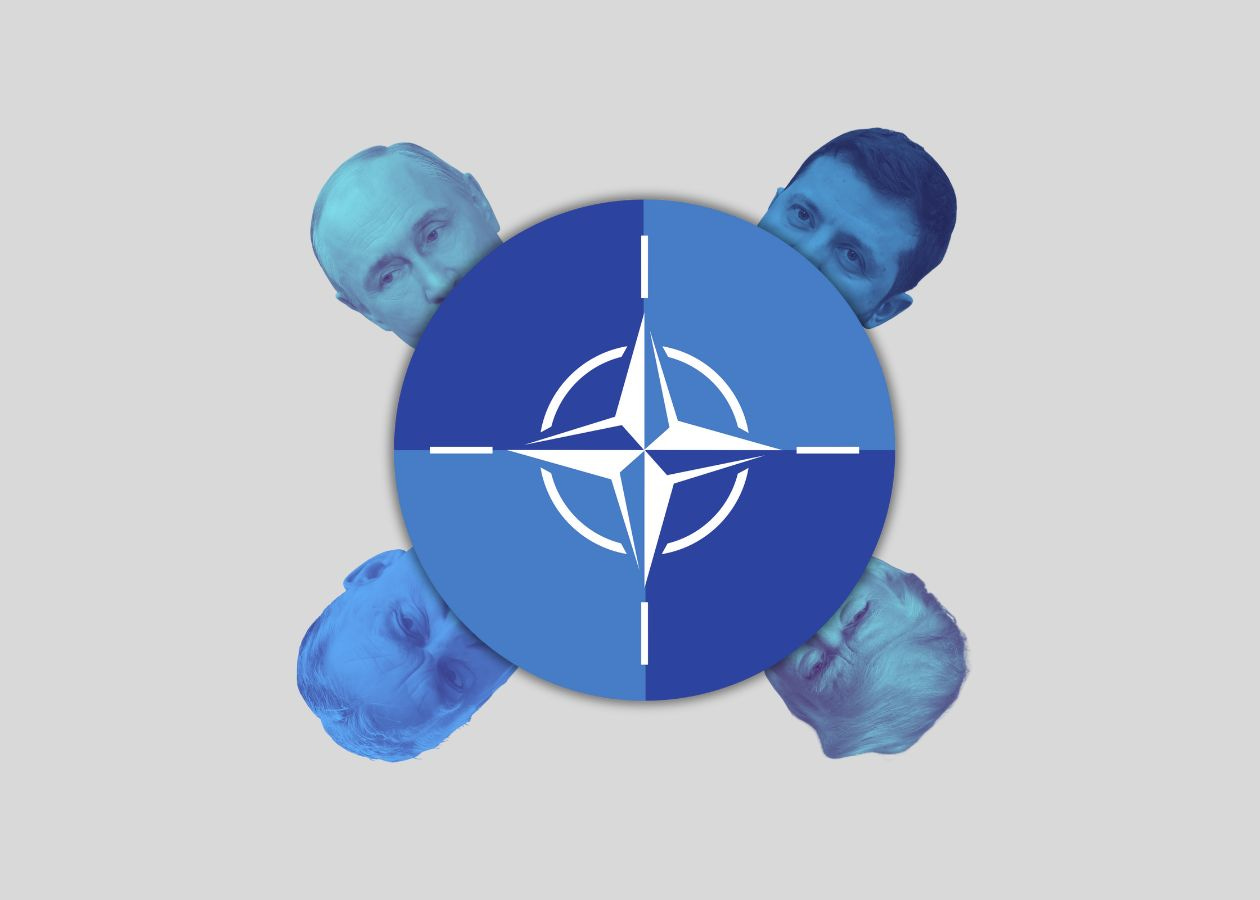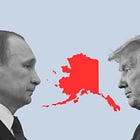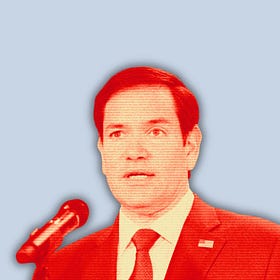What the Hell Is a “NATO-Style Security Guarantee” for Ukraine?
More meaningless jargon from the foreign policy blob on NATO, Ukraine, and Russia.
Registration for our first paid subscriber Zoom call with Garry Kasparov is now open! Upgrade and sign up today.
If you pay close attention to the news, you’ll realize that half of what politicians say is so mind-bogglingly sanitized as to be meaningless. The most jarring recent addition to the Western diplomatic lexicon has been the term “NATO-style guarantees” for Ukraine.
After Volodomyr Zelenskyy’s visit to Washington last week, and the shameful Trump-Putin summit in Alaska the Friday prior, allied leaders are coalescing around the idea of “NATO-style guarantees” for Kyiv.
Has anyone ever stopped to ask: What the hell is a “NATO-style guarantee?” For that matter, what is a straight-up NATO guarantee?
Many Americans hear the word “NATO” but don’t really absorb its significance. They know it’s something about foreign policy, something to do with Europe. Trump is against it. Putin claims to be afraid of it. Ukrainians aspire to be a part of it.
One strictly definitional answer would be this: NATO is the North Atlantic Treaty Organization; a military alliance between the US, Canada, and European countries. Its core gambit is embodied in NATO’s famous Article V: an attack on one member nation will be treated as an attack on all.
But that encyclopedia entry doesn’t give you context. To really understand what NATO is all about, and why the idea of “NATO-style guarantees” is so ridiculous, we need to go back to the alliance’s founding in 1949.
World War II hadn’t even been over for half a decade and the USSR had already unleashed a new wave of conquest and tyranny on the continent. The territories that Stalin occupied during the war with the Nazis were rapidly being transformed into Soviet-Russian colonies, independent in name only.
Free Europe was exhausted by two world wars in the span of thirty years. American intervention had twice stopped Germany from becoming a continental hegemon. The British, French, and others realized that the only way to stop the Soviets from inheriting Hitler’s dream of European domination was with US help, and they would not be waiting until an invading army was barreling across the River Rhine to phone Washington this time.
Lord Ismay, the British officer who served as NATO’s first secretary general, summed up the alliance’s historical mandate neatly:
To keep the Soviet Union out, the Americans in, and the Germans down.
Things have played out in quite the opposite direction.
To keep the Soviet Union out
Today, the Soviet Union is in (pardon me, I mean the Russian Federation—it’s hard to tell the difference sometimes).
Russia is in the capitals of NATO members like Hungary and Slovakia, whose governments function as Kremlin Trojan Horses inside the alliance. The only NATO leader who parrots Moscow’s talking points more eagerly than Donald Trump is Viktor Orban, and it’s Orban to whom Trump turns for geopolitical counsel.
Russia is in France and Germany, where pro-Putin opposition parties like the National Rally and AfD boast massive followings.
Russia is in the territory of alliance members like Romania, Poland, Lithuania, and Latvia, where Russian drones violate NATO airspace and the only consequence is a strongly-worded letter. And, of course, Russian troops are in their twelfth year as uninvited guests on Ukrainian soil.
To keep the Americans in
In Europe, the Americans are out.
Out of action. Out of energy. Out of political willpower. This unraveling took place quietly under President Biden and is proceeding loudly and quickly under Donald Trump.
On Joe Biden’s watch, the US provided military aid to Ukraine, but critical equipment often arrived only after deadly, months-long delays. Biden even went a step further, restricting NATO members’ transfers of American-manufactured weapons to Ukraine.
Trump, as usual, takes his predecessors’ mistakes and says: “Hold my Diet Coke.”
There was, of course, Trump’s infamous showdown with Zelenskyy and the Oval Office and his continued fawning over Vladimir Putin, whom Trump naively believes to be “very respectful of me and our country.” It would be adorable if it weren’t lethal. Meanwhile, the president is mulling withdrawing thousands of US troops from Europe while Russia actively menaces American allies there.
To keep the Germans down
The goal of keeping the Germans down is the only one of Lord Ismay’s three that’s been successful. The problem is that it’s been too successful. The Germans are so far down, they might as well be underground.
It’s true that some smaller NATO countries in Central and Eastern Europe are doing a lot to help Ukraine short of actually joining the fighting. But there is only so much they can do without an assist from Germany, the continent’s largest country and its biggest economy.
More from The Next Move:
German dithering gives other leading European powers an excuse to slow-roll support for Ukraine. When Berlin hesitates about providing key weapons systems to Kyiv. When they entertain fallacious negotiations with Russia over Ukraine’s future and fail to meaningfully support their fellow NATO members in Poland and the Baltics.
In eighty years, Germany has not found a middle ground between invading its neighbors once every generation and playing a constructive supporting role in the transatlantic security architecture.
Yes, the Germans have the burden of history on its shoulders, but self-indulgent inaction won’t right past wrongs.
There’s only one viable security guarantee
NATO has fought a handful of wars, all within the past thirty years: in Yugoslavia, in Afghanistan, and in Libya. The only time Article V was ever invoked was by the United States, following 9/11.
Yet the war NATO was actually designed to fight—a war to stop an aggressive Russia with imperial ambitions—is now being fought by non-NATO Ukraine.
If the Europeans and Americans cannot join directly, then they can at least render every material resource to Kyiv’s war effort. Instead, they accept the obtuse logic that simply providing the Ukrainians with an aging F-16 or even a Soviet MiG-29 is “escalation” but North Korea’s entry into the war on Russia’s side is fine and normal.
In this environment, a direct attack on the alliance is only a matter of time. The Russians have been probing the alliance’s eastern boundary for years, in cyberspace and in airspace. And when it happens, NATO may prove to be a paper tiger. After all, NATO is seventy-five years old. That’s well past retirement age for human beings, and possibly for international institutions as well.
Valerii Zaluzhny, Ukraine’s ambassador to the United Kingdom and former commander-in-chief of the armed forces, unpacked this reality with brutal honesty back in March:
The Baltic states understand that there is no real Article V, and there never was. Poland understands this, where from time to time either our missiles or Russian ones fall. Romania understands it too.
So if a NATO guarantee is worth nothing, a NATO-style guarantee is somehow worth less than nothing.
Some in Brussels, London, and Washington might find that embarrassing. They should.
If they want to do something about it, they can prove Zaluzhny wrong by giving Ukraine everything it needs to win the war. A decisive Ukrainian victory is the strongest security guarantee there is. No schoolyard bully has ever stood down in the face of theoretical consequences, but a broken nose does the job every time.
P.S. Whether you agree or disagree, let’s continue the discussion—in the comments, and on a Zoom call. Yes, Zoom! I’ve recently announced new Zoom calls for paid subscribers so that we can have a real conversation. Click here to upgrade and register for our first Zoom call.
More from The Next Move:
Suing Marco Rubio: Why We’re Supporting a Lawsuit to Defend Free Speech
We’re standing up for students’ constitutional rights—even when we fundamentally disagree with what they’re saying.
How to Teach the TikTok Generation That America Isn’t China
The kids are right to be concerned about our country’s direction, but social media-fueled despair won’t help us.







NATO-style would be the agreement we made in the 80’s to protect Ukraine if they gave up their nukes.
See how well that worked out for them.
Ukraine needs to be part of NATO. For their protection and for the rest of Europe.
Cheeto: The Putin Ass Kisser, Dictator, Traitor, and National Security Risk
The Christian Nationalist Movement/Nazi/GOP told Americans what direction they wanted to take the country in 2024 in part through the widely publicized Project 2025 As Vance’s buddy Curtis Yarvin has said, “the country should get over its dictatorphobia”, Cheeto’s actions actually have gone well past the Cheeto moniker of simply dictator
With Cheeto’s obvious Putin ass kissing in Alaska the most recent insider reports from Lev Parnas indicate that it’s going to get a lot worse and establish Cheeto as a full blown traitor to the country….a 21st century Benedict Arnold Mainstream media(MSM) will never contextualize this but now Cheeto is not only ready to invite a international criminal to the States to watch to the FIFA World Cup but also willing to lift sanctions on Cheeto’s motherland Russia so it will make it easier to fight Ukraine
These kinds of deplorable, disgusting, and traitorous actions need to be called out for what they truly are Why aren’t we willing to call Cheeto who he is?? Cheeto’s a traitor to the country and the office POTUS itself has become a national security risk